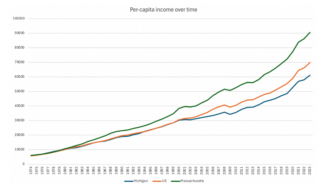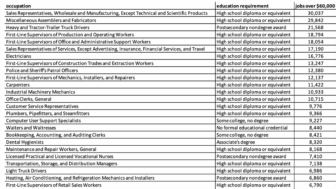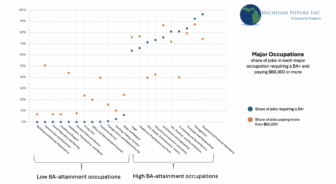
Let’s start the new year with the big picture. An overview of the structural economic challenges Michigan faces if we are to have an economy that as it grows benefits all.
- Redefining economic success. First is understanding that even though Michigan has a historically low unemployment rate and corporate Michigan is doing well (as are those of us who have a lot invested in the stock market in a time of high corporate profits) this is not time for celebration. The simple reality is you cannot have a good economy when 43 percent of households cannot pay for basic necessities. So changing the definition of economic success from a low unemployment rate and a growing economy to one that is based on a rising household income for all is the economic change we most need in Michigan. We will not deal with the structural challenges below if we don’t make the definition of success a Michigan economy that is benefiting all.
- Too many low-paid jobs. The core reason 43 percent of Michigan households cannot pay for basic necessities is that the economy is producing too many low-wage jobs. This is structural. Lots of businesses that employ lots of people have business models based on low-wage workers. We are not growing are way out of too many low-wage jobs. As Eduardo Porter wrote in a New York Times article the economy is characterized by “a sea of less educated workers who are stuck at businesses like hotels, restaurants and nursing homes that generate much smaller profits per employee and stay viable primarily by keeping wages low”.
- Too few with the education attainment to get better-paying jobs. The most reliable path to the middle class is a four-year degree. Michigan is a national laggard in college attainment. About 3/4 of Michigan jobs in occupations with median wages of $62,000 or higher require a four-year degree. And for the 1/4 that don’t require a four-yer degree there are too few Michigan adults with the skills required to get those jobs. Even more worrisome is that our education system is almost certainly not preparing way too many of our kids for the good-paying jobs of the future.
- Too low talent concentrations to attract high-wage employers. Michigan needs more high-wage jobs. But you can’t retain, attract and grow high-wage jobs without large talent concentrations. This is an economy where talent attracts capital. Not the other way around. That is the core lesson of Michigan’s failure to have any region make the final twenty considered for Amazon HQ2. The asset that matters most to high-wage employers are deep pools of workers with four-year degrees––particularly young professionals. Those young professionals are concentrating in high-density, high-amenity neighborhoods where you do not need to own a car. Michigan has way too few of those neighborhoods.
- Too many Michiganders don’t work. The state’s unemployment rate is at historic lows, it’s employment to population ratio is not. Michigan ranks 38th in the proportion of those 16 and older who work. We were a not great 28th in 2000.
So the big picture of the Michigan economy is that these are the challenges Michigan most needs to deal with if we are to have an economy that as it grows benefits all. It is way past time that we reject the belief that you cannot have both: a growing economy and shared prosperity. It is time we get to work, on a bi-partisan basis, on creating an economy with both. We can and should debate how you do that, what we shouldn’t do is keep on celebrating an economy where 43 percent of Michigan households can’t pay for basic necessities.







